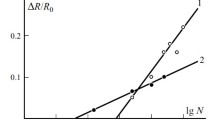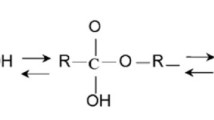Abstract
The effect of environment on the physical and mechanical properties of composite materials in some cases is determined by the environmental sensitivity of the binder. The results of experimental investigation of the deformability and strength of polyester resin, widely used as a binder in composites, upon the action of stationary and quasi-stationary loads, temperatures, and moisture are presented. The ranges of acceptable values of these services factors are determined. The elastic modulus and tensile strength of the material are obtained from quasi-static tests. The viscoelastic behavior of the resin is investigated in creep tests. From the results of a short-term experiment with stepwise loading up to failure, it is found that the creep of specimens with a moisture content of 0.14% can be described by a linear viscoelastic model for stresses up to 20 MPa (two thirds of the strength). The action of single loading impulses is summarized according to the Boltzmann superposition principle. The temperature and absorbed moisture are considered as factors accelerating the relaxation processes in the material. The creep activation under the action of these factors is described using the methods of time-temperature and time-moisture equivalence. The results of short-term creep tests allow us to determine the relaxation characteristics of the material in stationary conditions. The long-term creep under close-to-service conditions is predicted using these data and quite good agreement with the control test is obtained. The sensitivity of the material characteristics (strength, elastic modulus, and creep strain) to the action of temperature and moisture is estimated. The creep strain is most sensitive to the action of environmental factors. For a fully saturated material (moisture content 1.64 wt.%), after one hour creep, this strain four times exceeds that of a dry one. The same growth in deformability is caused by an 18°C increase in temperature. A quantitative comparison of the characteristics of polyester and epoxy resins allows us to choose the binder for composites and to estimate the expected environmental effect.
Similar content being viewed by others
References
G. S. Springer, Environmental Effects of Composite Materials. Vol. 3, Technomic Publ. Co., Inc. (1988).
R. D. Stepanov and O. F. Shlenskii, Strength Calculation of Plastic Structures Working in Liquid Media [in Russian], Moscow (1981).
Y. J. Weitsman, “Composites in the sea: sorption, strength and fatigue,” in: ICCM-12, Proc., CD-disk, paper 1304, Paris (1999).
K. Ogi and Y. Takao, “Influence of moisture on the stress-strain response and damage processes in quasi-isotropic carbon/epoxy laminates,” in: ECCM-8. Vol. 3, Naples (1998), pp. 175–182.
A. Yoosefinejad and P. J. Hogg, “Durability and damage tolerance of FRCs exposed to aggressive environments,” in: ECCM-8, Vol. 1, Naples (1998), pp. 151–156.
R. D. Maksimov, L. Jirgens, J. Jansons, and E. Plume, “Mechanical properties of polyester polymer-concrete,” Mech. Compos. Mater.,35, No. 2, 99–110 (1999).
Yu. S. Urzhumtsev and R. D. Maksimov, Prediction of Deformability of Polymer Materials [in Russian], Zinatne, Riga (1975).
S. Sihn and S. W. Tsai, “Automated shift for time-temperature superposition,” in: ICCM-12, Proc., CD-disk, paper 462, Paris (1999).
S. Somiya, K. K. Biswas, N. Iwamoto, K. Igarashi, and T. Kawakami, “Creep design using fiber contents on FRTP,” in: ICCM-12, Proc., CD-disk, paper 940, Paris (1999).
I. M. Ward, Mechanical Properties of Solid Polymers, Wiley-Interscience, London—New York—Sydney—Toronto.
A. N. Aniskevich, “Comparative analysis of deformability of some wetted polymer binders,” in: Proc. Polymer Composites ’98, Gomel’ (1998), pp. 66–67.
Author information
Authors and Affiliations
Additional information
Translated from Mekhanika Kompozitnykh Materialov, Vol. 36, No. 3, pp. 395–406, May–June, 2000.
Rights and permissions
About this article
Cite this article
Plushchik, O.A., Aniskevich, A.N. Effects of temperature and moisture on the mechanical properties of polyester resin in tension. Mech Compos Mater 36, 233–240 (2000). https://doi.org/10.1007/BF02681875
Received:
Issue Date:
DOI: https://doi.org/10.1007/BF02681875




